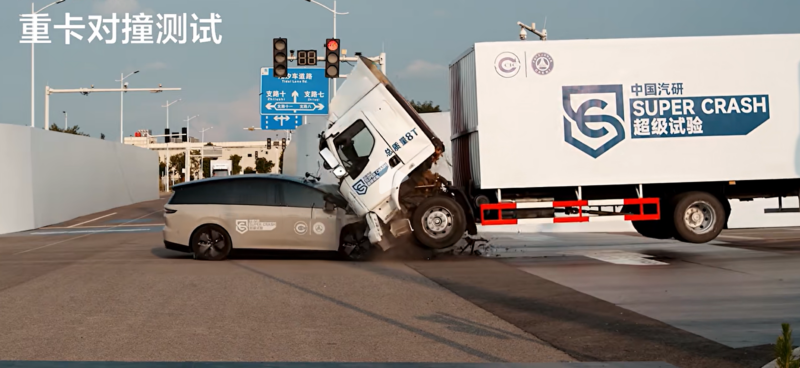On July 29, Li Auto unveiled its latest model, the BEV i8, during a launch event that quickly turned controversial. The company released a video showcasing a head-on collision test between the i8 and a truck, both travelling at 100 km/h. The footage depicted the truck’s wheels lifting off the ground, with severe damage to the cabin and cargo area, raising concerns about the truck’s safety.
Ideal Auto claimed that following the collision, the i8’s A, B, and C pillars, along with the door beams, remained undamaged. All nine airbags deployed successfully, and there were no leaks or fires from the battery pack. Additionally, the doors automatically unlocked, and the handles popped open.
CEO Li Xiang emphasised the truck’s weight, stating, “I confirmed with my colleagues that the truck weighs 8 tons, not 8 tons loaded,” aiming to highlight the i8’s superior passive safety features.
The truck involved in the test was identified as a Dongfeng Liuzhou Motors vehicle.
The day after the launch, the crash test video garnered significant attention online, leading to mixed reactions in the comments section of the truck’s official page. Some users criticised the test, while others defended it. The truck manufacturer responded, suggesting that the situation was misleading and that “smart people can see through the deception.”
In a surprising move, Li Auto later blurred the logo on the truck’s steering wheel in the video, possibly acknowledging the backlash.
By July 31, all parties involved issued statements, revealing significant disagreements. The truck manufacturer accused Li Auto of infringement, claiming the video was released without permission and that the test conditions were not representative of real-world scenarios. They argued that this undermined fair competition and raised concerns about consumer manipulation.
In contrast, Li Auto defended the crash test as a legitimate simulation of real traffic encounters, conducted by a reputable third-party testing agency. They asserted that the testing environment and equipment were provided by the agency, with no influence from Li Auto.
The testing agency, China Automotive Engineering Research Institute, confirmed that the entire testing process adhered to regulations and standards, denying any adjustments based on client preferences. They stated that the test truck was brand new, although further details regarding its source would need to be confirmed.
With each party holding firm to their stance, it is evident that the Dongfeng Liuzhou brand has suffered the most damage from this incident. A representative quoted by Chinese media QQ news expressed concerns that the video suggested the truck’s suspension was altered, leading to the exaggerated results observed during the test.
Editor’s comment
The recent controversy surrounding Li Auto highlights the issue of “over-marketing” among Chinese automotive manufacturers. This problem previously emerged in the realm of autonomous driving, leading to a nationwide ban on excessive marketing in this sector following a fatal incident involving Xiaomi’s SU7 at the end of March this year.
The uproar over Li Auto’s crash test stems from its challenge to common intuitions and perceptions. Typically, in accidents involving heavy trucks and smaller passenger vehicles, the latter suffers more damage. With the Li i8 weighing 2.6 tons and the truck at 8 tons, many find it hard to believe that the i8 could lift the truck’s wheels off the ground.
This incident has posed significant challenges for Li Auto, with some consumers – including existing owners – expressing deep scepticism about the company’s products, suspecting that it may have fabricated details surrounding the event. The situation has even transformed into a meme on Chinese social media, with users making comparisons between the i8 and nuclear weapons or other destructive devices.
In the comments section of various platforms, many users suggested that both parties should conduct another crash test, with the CEOs sitting in the vehicles. However, this is clearly not a feasible option. As it stands, a majority of netizens continue to express disbelief in the claims made by Li Auto.
Follow us for ev updates
